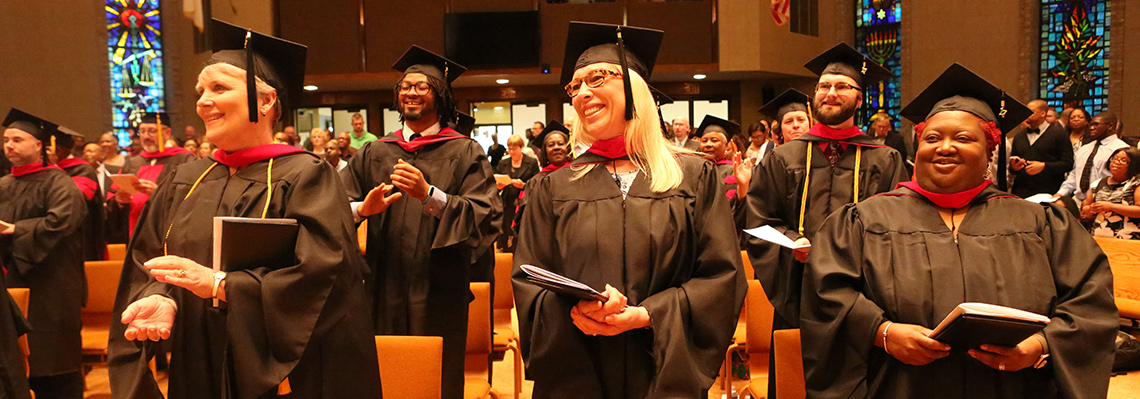Our MDiv fits into your busy life!
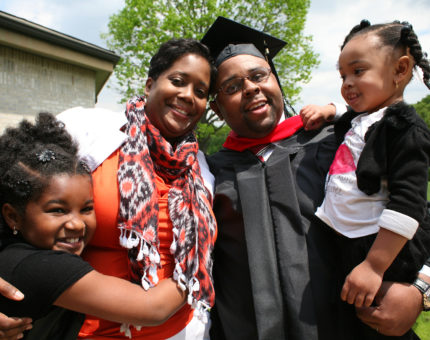
Our Master of Divinity is designed for those seeking a vocation in ordained ministry or preparation for doctoral studies in religion.
New MDiv Program
Our new Master of Divinity degree (MDiv) prepares you to serve as a spiritual leader in your community. You will gain hands-on training for diverse religious, spiritual, and nonprofit careers while immersing yourself in transformative experiences. The MDiv is required for ordination in many denominations and sets the stage for advanced studies.
Our fully accredited MDiv is offered online and in person on both the Lancaster Seminary campus in Lancaster, Pa., and on the Moravian Seminary campus in Bethlehem, Pa.
Here’s What It Takes
Our MDiv is a 78-credit degree program. There are 54 required credits along with 24 credits set aside for electives and denomination-specific requirements.
You can finish in three years by taking 12+ credits per semester or finish in four-to-six years by taking fewer than 12 credits per semester.
Flexible and Innovative
Our MDiv is designed to fit your busy schedule, with full-time and part-time options, and courses offered both in person on-campus in Bethlehem and Lancaster and online.
We also offer a weekend schedule with classes on Friday evenings and Saturday mornings that is ideal for working adults.
Weekday classes are held on Monday, Tuesday, and Thursday at 4:00 p.m. and 7:00 p.m. and on Friday starting at 7:00 p.m. No classes are held on Wednesday. Saturday classes are held at 9:00 a.m. and sometimes at 11:15 a.m.
It’s About Contemporary Realities
Our courses are timely and relevant, driven by questions the Church and the world are asking. Combined with the deep learning at the heart of our rich academic heritage, you will be prepared for the challenges of contemporary religious engagement.
Curriculum Overview 2024 – MDiv
Learning Outcomes:
Our Master of Divinity Program addresses these learning outcomes:
- Interpret sacred and theological texts, artifacts, and practices of one’s own and other relevant traditions with sensitivity to literary, historical, and cultural contexts, and to the social and spiritual implications of interpretation.
- Assess the social, ecological, economic, political, cultural, and interreligious dynamics of diverse contexts of ministry through local engagement and global awareness.
- Critically and constructively reflect on one’s understanding and experience of the divine, the self, and others within the theologies and spiritualities of one’s own tradition and in conversation with others.
- Articulate and practice a theological and ethical understanding of authority, power, and accountability that recognizes, supports, and affirms the dignity and worth of all persons.
- Cultivate and apply appropriate liturgical, administrative, and relational leadership practices that foster healing, discernment, and empowerment of individuals and communities in the settings to which they are called.
Plus…
ECUMENICAL COMMITMENT At Lancaster Seminary, we’re committed to engaging the differences among people as a resource for learning and faith. We seek to help you learn from the diversity of God’s people without insisting on particular doctrines or a single theological perspective.
CAMPUS HOUSING is available for commuting students at Lancaster with hotel-style rooms for overnights in addition to one- and two-bedroom apartments for full-time residential students.
Our Innovative Curriculum
Required Courses:
| Church History from Pentecost to Yesterday
This course seeks to familiarize students with the large sweep of the history of Christianity as a global religion so that they are able to identify key figures, movements, traditions, and turning points within it, from the early centuries in the Mediterranean world to the world-wide church of today. Attention will be given to the relationship of Christian life and thought to the changing historical, political, and social contexts. Students learn basic historical methodology, craft historical arguments, and make connections between past and present. This course will help students make sense of the complexity of Christianity and will provide them with resources for pastoral ministry and theological reflection. |
Leading Future Faith Communities
This course will introduce students to skills necessary to lead congregational and non-profit ministries. It will cultivate awareness of attributes helpful in leadership. It will allow students to learn more about preferred styles of their own preferred styles of leadership and cultivate awareness and appreciation of other approaches as well. |
| Ecumenical Encounters: Articulating Faith in a Global Church
Christianity is globally diverse. This course is designed to enable students to articulate their own convictions on major theological topics in respectful conversation with major streams (theological thinkers, texts, and movements) within the multi-faceted world-wide doctrinal and practical expressions of Christian churches. |
New Testament and Early Christianity
This class introduces students to processes of and approaches to New Testament interpretation with a view toward vocational application. It provides a broad familiarity with contents and central themes of New Testament, early Christian, and other contemporary texts. |
| Engaging the Questions Together
This course brings together students from a cross section of masters level degrees and certificates to engage significant theological, ethical, and ministerial/pastoral questions. It expects students to deploy insight and learnings from their current and prior coursework as they consider those questions. With attention to the social and spiritual implications of interpretation, the course requires students to deploy a variety of analytical tools and pastoral skills, with the acknowledgement that simplistic responses are inadequate for complex issues. |
Proclamation and Public Rhetoric
This course is designed to give an overview of the theory and practice of public speaking, centering on Christian proclamation in the context of public worship, and public oratory. It covers a brief history of public rhetoric, and spends time on the theology and place of preaching in communities of faith, with attention to culturally diverse groups. It will also build upon verbal communication skills, providing support for students to improve and care for their voices as they develop vocal stamina. Students will learn a variety of styles of oratory from conception to delivery, in order to explore and develop their own public voice. |
| Field Education
Field Education 1: This course is the first in a two semester supervised ministry sequence and requires a one-year concurrent field education placement. This course has two key components: 8-10 hrs per week in an offsite field education and a biweekly 2-hr classroom component. In conjunction with the work that students are doing in their field education placement and their weekly on-site supervision, students meet with a faculty-led seminar class to process their offsite work and join in on-going theological reflection on their field education experiences and what they are learning about themselves, ministry, and community dynamics. Field Education 2: This course is the second in a two semester supervised ministry sequence and requires a one-year concurrent field education placement. This course has two key components: 8-10 hrs per week in an offsite field education and a biweekly 2-hr classroom component. In conjunction with the work that students are doing in their field education placement and their weekly on-site supervision, students meet with a faculty-led seminar class to process their offsite work and join in on-going theological reflection on their field education experiences and what they are learning about themselves, ministry, and community dynamics. This course is intended to be taken in the semester following THEO 551 within the same academic year. |
Praxis and Social Change
This course prepares students for religious leadership in diverse public contexts. Students will develop theological categories for social engagement, resources for social analysis, strategies for pastoral communication and communal care, and models for effective social action on the part of religious communities. The course engages active learning pedagogies, including a multi-stage project devoted to social change in students’ contexts. While contemporary topics may vary from year to year, each year the course will explore the intersection among religion, race, and ethnicity. |
| Intercultural Immersion Seminar
This course provides students with an intercultural experience that offers students opportunities to expand their global consciousness and empathy through immersion in a culture different than their own; engage in personal reflection on their place within an interconnected world; and to cultivate meaningful relationships with their peer group and the peoples in the host cultures. The intercultural immersion experience involves travel in the US or internationally. Typically, travel will span 10 days and take place in May, following institutional graduation. This course will include periods of preparation for the travel experience and reflection afterward, which may occur via a variety of in person, hybrid, or synchronous formats. |
Religious Education in Theory and Practice
This course equips students for the educational dimensions of all forms of ministry. It explores a variety of theories of Christian education and their theological and philosophical foundations. Particular pedagogical skills are examined and practiced, with an emphasis on group theory and leadership. Communal and individual contextual factors influencing the ways that students learn are taken into account. |
| Introduction to Christian Ethics
Christian traditions have usually divided the Christian life into activities directed toward God, and activities directed toward other creatures, particularly humans. Ethical reflection as it evolved within the churches concerns this second set of activities. This course provides a basic background in the theory and practice of Christian ethics, including its biblical, theological, and philosophical foundations, and presents a framework for moral deliberation in Christian, multi-faith, and secular settings. |
Spiritual Care in Contemporary Contexts
This course will survey historical and contemporary models of spiritual/pastoral care and will introduce students to the basic knowledge, skills, and personal attributes needed for the practice of care in a variety of contexts, including parish based ministry, chaplaincy, and other non-profit settings. Training and practice in listening skills, spiritual/pastoral assessment, theological reflection, crisis care, and responding to a variety of common spiritual/pastoral issues will be included. |
| Introduction to the Old Testament
This course equips students to engage the richness and the challenges of the Old Testament critically, imaginatively, and theologically. Students will increase their knowledge of the content and character of the collection, the historical and cultural contexts of its origins, and the diversity embedded in the texts and their interpretation. They will develop their abilities to interpret Old Testament texts in ways that engage critical methods of biblical studies and honor the dignity of diverse peoples and our planet. |
Spiritual Quests and Theological Reflection
An introductory course on theology defined as the self-critically reflective dimension of the Christian life, and that it is imperative for all Christians to engage in this activity. Theology happens when Christians try to determine what they should do, how they should feel, and what they should think about their world in order to live as genuine persons of faith, i.e. something that Christians do when they are perplexed about how to live their lives most faithfully. This course invites students to read the works of others who have undertaken this task, and guides students as they do the same. Topics will be studied in the context of their historical development as well as confronting contemporary questions, ideas, and beliefs. |
| Introduction to Theological Education
This course will introduce new students to the diversities present in the Seminary community and to institutional commitments toward forming a supportive community of learning and theological reflection. Students will be introduced to anti-racist frameworks, power, and privilege dynamics (to include the intersections of gender, sexuality, socio-economic class, abilities, etc.), and the role of language (inclusivity, pronouns, etc.) to include or exclude others. It will also introduce students to contemplative spiritual practices and theological writing. |
Worship
This course is designed to give an overview of the theory and practice of public speaking, centering on Christian proclamation in the context of public worship, and public oratory. It covers a brief history of public rhetoric, and spends time on the theology and place of preaching in communities of faith, with attention to culturally diverse groups. It will also build upon verbal communication skills, providing support for students to improve and care for their voices as they develop vocal stamina. Students will learn a variety of styles of oratory from conception to delivery, in order to explore and develop their own public voice. |
Lancaster Theological Seminary has partnered with Baltimore’s St. Mary’s Ecumenical Institute to create a path to a Master of Divinity.
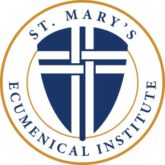
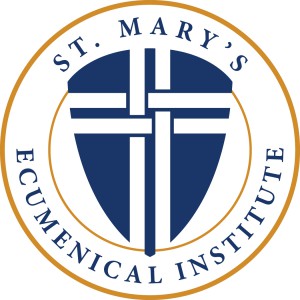
Students begin their MDiv coursework from the Ecumenical Institute.
For details or to schedule an appointment, email the Ecumenical Institute, ei@stmarys.edu.
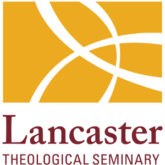
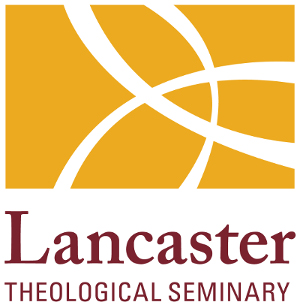
Students complete the final portion of their Master of Divinity program at Lancaster Seminary.

